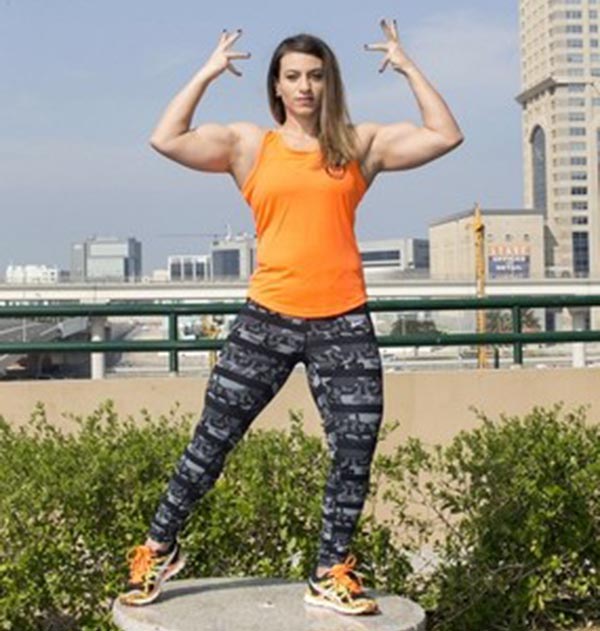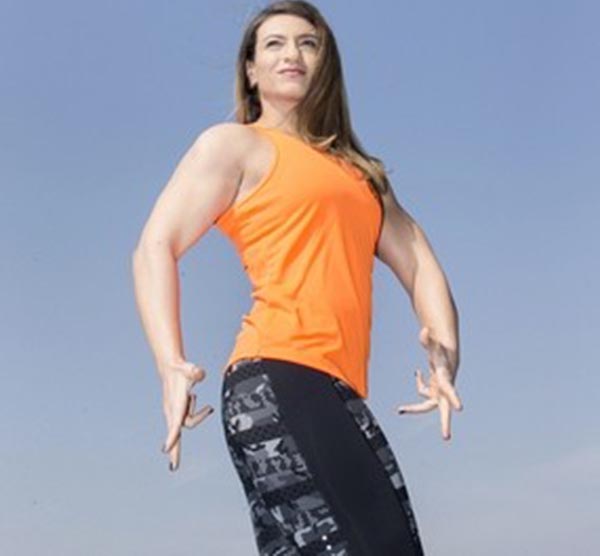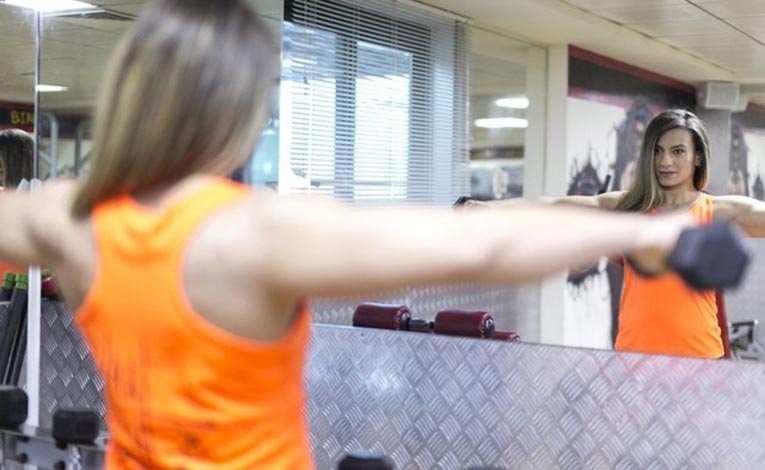Bulging muscles are deemed by some to be a highly desirable trait in a man. But in a woman? That tends to spark a bit more debate.
Bahraini bodybuilder Haifa Musawi argues that rippling muscles can look as good on the female form as they do on the male body.
She is determined to challenge regional social norms by becoming the first Gulf Arab woman to compete internationally in the sport of bodybuilding.
“It’s not very common here to see a woman with muscles, so I get stared at a lot”, says Musawi, who works as a personal trainer in Dubai. “People are really surprised because female bodybuilders are something a bit different for them.”
But she takes the occasional lingering look and pointed comment in her stride.
“Honestly, the criticism I’ve received has made me more confident about my passion for my sport,” she says.
For most of the year, while in peak performance training, Musawi does weight training and cardio for three hours a day, and constantly monitors her body-fat percentage to keep it low.
“My career revolves around bodybuilding, it’s a lifestyle that I’m living every single day,” she says. “Many people don’t understand it. They just think we pump some iron in the gym and we look this way – but there’s so much science behind it.”
The 32-year-old began lifting weights in Bahrain when she was 17 years old and overweight.

“I weighed more than 85kg because although I was pretty active, like many kids in the Middle East, I was eating a lot of fatty and sugary foods,” she says.
Musawi enlisted the help of a personal trainer, who introduced her to bodybuilding – a sport virtually unheard of among Bahraini females. She drew inspiration from images in magazine articles about the sport.
“I wanted to lose weight but also I wanted to be as fit as possible, and I found bodybuilding very inspiring,” she says.
“My trainer made me understand and focus on all the different aspects of bodybuilding, instead of just concentrating on my body image. I was very lucky to meet somebody who could push me at that age.”
It took two months before she began to see any obvious results, and six before major changes appeared. And it all happened, Musawi points out, “with no skin sagging”.
She also embraced a bodybuilder’s diet of moderate carbs and high protein, and started taking protein, amino acid and multi-vitamin supplements.
Musawi moved back to Bahrain to work in public relations after attending college in Dubai. She returned to the UAE more than two years ago to work as a personal trainer and as the Middle East brand ambassador for Scitec Nutrition supplement – and has been living in Dubai ever since.
Now she is one of 14 people from across the region featured in Portrait of Arabia, a series of three-minute profiles of residents on Quest Arabiya, a 24-hour Arabic-language adventure channel that launched in December, through a partnership between Image Nation and the Discovery Network.
She hopes that her appearance, along with other media coverage in newspapers and magazines will challenge stereotypes about women in the region, and female bodybuilders in particular.
She recalls another TV appearance, in which she became outraged that her gender was clearly influencing the coverage.
“I was not asked the sort of questions that an athlete on a TV station should be asked,” she says. “They said: ‘Do people think you are manly?’ and ‘Do you like your body the way it is?’
“Who would ask a bodybuilder if she likes her body or not? It was very inappropriate.”

When people on social media criticize bodybuilding for making women appear less feminine, Musawi has a simple response.
“Weight training for women is a well-being-enhancing revolution,” she says. “A woman’s femininity won’t be affected by her improved physical strength – but it will by her ignorance.” Musawi is reluctant to discuss her family’s reaction to her sport – but she acknowledges that she faces a lot of criticism “through ignorance”. She tends to quickly brush it off, she says.
But while she might face the occasional nasty comment, her social-media pages – where she goes by the name Haifa D Trainer – are filled with messages of support.
There are also now several female bodybuilders in Binous Target gym, on Sheikh Zayed Road, opposite Emaar Business Park, where Musawi works out and trains others, including some Arabs. It is her dream that others will join them.
“I would like to see this sport growing among Arab women, not necessarily to become bodybuilders but to be aware of the advantages of weight training for women.”
It’s not only women who Musawi inspires. Men have also joined her “Team Haifa” training program. One is the Emirati software engineer Ali Al Haddad.
“He is aiming to compete in bodybuilding competitions within a year, so I’m preparing him for that,” says Musawi.
Not all of her clients are aiming for glistening, pumped-up pecs, however.
“They have different goals,” she explains. “Some of them are football players. I train them physically for whatever they do.”
In June, Musawi finished sixth in the physique category of the International Natural Bodybuilding Association championships, a drug-free competition that was held for the first time in Dubai. She was one of only two female Arab bodybuilders at the event – the other was a woman from Jordan.
But Musawi cannot represent Bahrain or the UAE in her sport, because there is no national bodybuilding team for women in the Gulf region. Her way around this obstacle is to instead represent Portugal, with the help of her Portuguese trainer Andrea Sousa. The country’s bodybuilding federation has said it can register Musawi there as an athlete.
“I have to do the national competition in Portugal – the Nacional de Culturismo – in April to qualify to do professional bodybuilding competitions around the world,” she explains. “I will be competing in Portugal, but I won’t be moving there since my career is here in Dubai.
“My goal is to be a top athlete worldwide. I’m trying to get that strong and I’m on the road to that now.”
Musawi says that more important than the changes bodybuilding has made to her body image are the changes it has made to her on the inside.
“I think bodybuilding is more of a life lesson than a sport,” she says. “It has made me very consistent, focused, and goal orientated.
“What gives me satisfaction is that feeling of wanting to reach my goal, not only in this sport but in life in general.”
Courtesy of: The National
